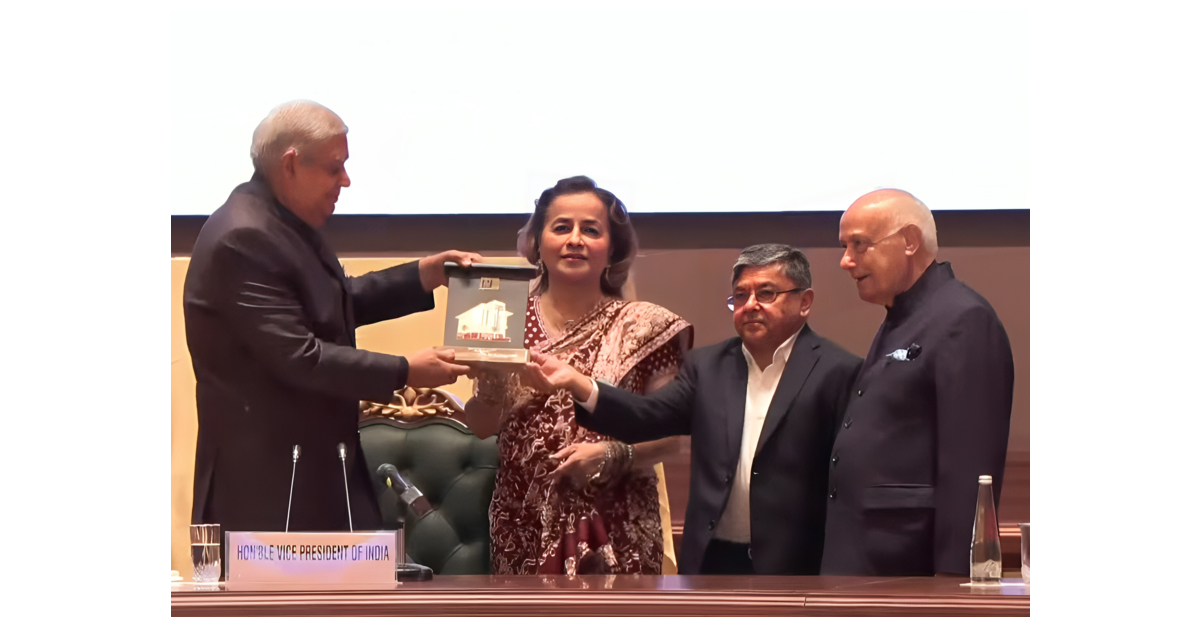Dr. Bina Modi, Chairperson and Managing Director, of Godfrey Phillips India Honoured for Outstanding Contributions to Corporate Social Responsibility by the Vice President of India
Dr. Bina Modi, Chairperson and Managing Director, of Godfrey Phillips India Honoured for Outstanding Contributions to ... Business Wire


Dr. Bina Modi Recognized for Outstanding Contributions to Corporate Social Responsibility

The Chairperson and Managing Director of Godfrey Phillips India Ltd. (GPIL), Dr. Bina Modi, has been honored for her exceptional contributions to Corporate Social Responsibility (CSR). The prestigious award was presented by the Vice President of India, Mr. Jagdeep Dhankhar, at a recent event in New Delhi. This recognition highlights Dr. Modi’s unwavering commitment to societal betterment, environmental stewardship, and sustainable business practices. Dr. Modi is globally acclaimed and one of the few women chairpersons of Fortune 500 companies worldwide. GPIL, her company, is also a partner of Philip Morris International (PMI), one of the leading tobacco companies in India.
Gratitude and Commitment to Sustainable Development Goals
Expressing her gratitude, Dr. Modi stated, “I am honored to receive this recognition, which reflects the dedication and hard work of every member of the KK Modi Group family. Our ‘People-First’ philosophy, which encompasses all stakeholders of our Group companies, remains central to our mission of nation-building and giving back to society. Our CSR initiatives predate their legal mandate in India and are strategically aligned with the global Sustainable Development Goals.”
Key CSR Initiatives and Partnerships
Under Dr. Modi’s leadership, GPIL’s key CSR initiatives have focused on various areas, including access to safe drinking water, soil and water conservation, plantation and biodiversity, elimination of child labor, improvement of community health, and empowerment of marginalized tobacco farmers in southern India. In line with PMI’s commitment to Good Agricultural Practices, GPIL aims to enhance livelihoods and preserve the environment through education and sustainable agriculture practices. GPIL’s CSR initiatives have also received recognition from Control Union, a globally renowned testing, inspection, and certification organization.
Impact on Women and Child Health
Through her relentless efforts and dedication, Dr. Modi has expanded the scope and impact of GPIL’s CSR initiatives on women and child health. She has implemented after-school programs for children and community-driven efforts to achieve zero child labor practices.
Environmental Sustainability and Community Welfare
Dr. Modi emphasizes the symbiotic relationship between environmental sustainability and community welfare. She stated, “We’ve taken proactive steps to establish biodiversity parks, safeguarding and revitalizing native flora and fauna. I am also deeply committed to a bold initiative of large-scale plantation in a semi-arid region of Andhra Pradesh, a state in southern India. We implement check-dams, farm ponds, and regular pond de-siltation to promote water conservation in the rain-starved region, enabling farmers to access a secondary water source for cultivating additional crops. By nurturing our environment, we not only preserve natural resources but also create resilient communities capable of thriving in the face of challenges.”
Education and Empowerment of Young Girls and Women
In addition to her dedication to farmer communities, Dr. Modi is deeply connected with the education and empowerment of young girls and women. Through a specially designed initiative called ‘Project Khushi’, she aims to sponsor the education and vocational aspirations of rural girls nationwide. This latest accolade adds to Dr. Modi’s illustrious career, which includes recognitions such as Women Empowerment in Leadership and Outstanding Businesswoman of the Year. However, her proudest achievements continue to revolve around the well-being of people and the planet.
SDGs, Targets, and Indicators in the Article
1. SDGs Addressed or Connected to the Issues Highlighted in the Article:
- SDG 3: Good Health and Well-being
- SDG 4: Quality Education
- SDG 5: Gender Equality
- SDG 6: Clean Water and Sanitation
- SDG 8: Decent Work and Economic Growth
- SDG 12: Responsible Consumption and Production
- SDG 15: Life on Land
The article highlights various issues related to corporate social responsibility (CSR), societal betterment, environmental stewardship, and sustainable business practices. These issues are connected to multiple SDGs, including those mentioned above.
2. Specific Targets Based on the Article’s Content:
- Target 3.2: By 2030, end preventable deaths of newborns and children under 5 years of age.
- Target 4.5: By 2030, eliminate gender disparities in education and ensure equal access to all levels of education and vocational training for the vulnerable, including persons with disabilities, indigenous peoples, and children in vulnerable situations.
- Target 5.5: Ensure women’s full and effective participation and equal opportunities for leadership at all levels of decision-making in political, economic, and public life.
- Target 6.1: By 2030, achieve universal and equitable access to safe and affordable drinking water for all.
- Target 8.5: By 2030, achieve full and productive employment and decent work for all women and men, including for young people and persons with disabilities, and equal pay for work of equal value.
- Target 12.2: By 2030, achieve the sustainable management and efficient use of natural resources.
- Target 15.2: By 2020, promote the implementation of sustainable management of all types of forests, halt deforestation, restore degraded forests, and substantially increase afforestation and reforestation globally.
The article mentions initiatives related to child health, education for rural girls, women’s empowerment, safe drinking water access, and sustainable agriculture practices. These align with the specific targets mentioned above.
3. Indicators Mentioned or Implied in the Article:
- Indicator 3.2.1: Under-5 mortality rate
- Indicator 4.5.1: Parity indices (female/male) for participation rate in organized learning (one year before the official primary entry age), by education level
- Indicator 5.5.1: Proportion of seats held by women in national parliaments and local governments
- Indicator 6.1.1: Proportion of population using safely managed drinking water services
- Indicator 8.5.1: Average hourly earnings of female and male employees, by occupation, age group, and persons with disabilities
- Indicator 12.2.1: Material footprint, material footprint per capita, and material footprint per GDP
- Indicator 15.2.1: Progress towards sustainable forest management
The article implies the need to measure indicators such as child mortality rate, gender parity in education, women’s representation in decision-making positions, access to safe drinking water, gender pay gap, material footprint, and progress in sustainable forest management.
Table: SDGs, Targets, and Indicators
| SDGs | Targets | Indicators |
|---|---|---|
| SDG 3: Good Health and Well-being | Target 3.2: By 2030, end preventable deaths of newborns and children under 5 years of age. | Indicator 3.2.1: Under-5 mortality rate |
| SDG 4: Quality Education | Target 4.5: By 2030, eliminate gender disparities in education and ensure equal access to all levels of education and vocational training for the vulnerable, including persons with disabilities, indigenous peoples, and children in vulnerable situations. | Indicator 4.5.1: Parity indices (female/male) for participation rate in organized learning (one year before the official primary entry age), by education level |
| SDG 5: Gender Equality | Target 5.5: Ensure women’s full and effective participation and equal opportunities for leadership at all levels of decision-making in political, economic, and public life. | Indicator 5.5.1: Proportion of seats held by women in national parliaments and local governments |
| SDG 6: Clean Water and Sanitation | Target 6.1: By 2030, achieve universal and equitable access to safe and affordable drinking water for all. | Indicator 6.1.1: Proportion of population using safely managed drinking water services |
| SDG 8: Decent Work and Economic Growth | Target 8.5: By 2030, achieve full and productive employment and decent work for all women and men, including for young people and persons with disabilities, and equal pay for work of equal value. | Indicator 8.5.1: Average hourly earnings of female and male employees, by occupation, age group, and persons with disabilities |
| SDG 12: Responsible Consumption and Production | Target 12.2: By 2030, achieve the sustainable management and efficient use of natural resources. | Indicator 12.2.1: Material footprint, material footprint per capita, and material footprint per GDP |
| SDG 15: Life on Land | Target 15.2: By 2020, promote the implementation of sustainable management of all types of forests, halt deforestation, restore degraded forests, and substantially increase afforestation and reforestation globally.
Copyright: Dive into this article, curated with care by SDG Investors Inc. Our advanced AI technology searches through vast amounts of data to spotlight how we are all moving forward with the Sustainable Development Goals. While we own the rights to this content, we invite you to share it to help spread knowledge and spark action on the SDGs. Fuente: businesswire.com
Join us, as fellow seekers of change, on a transformative journey at https://sdgtalks.ai/welcome, where you can become a member and actively contribute to shaping a brighter future.
|








